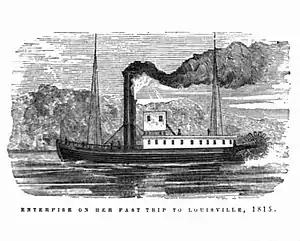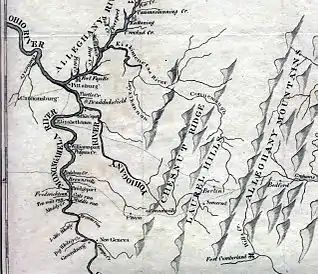Israel Gregg
Israel Gregg (February 20, 1775 – June 20, 1847) was the first captain of the historic steamboat Enterprise. From June to December 1814, Israel Gregg commanded the Enterprise during two voyages from Louisville, Kentucky to Pittsburgh, Pennsylvania that were performed against strong currents of the Ohio River.[1] With these voyages Israel Gregg and the Enterprise demonstrated for the first time that steamboat commerce was practical on the Ohio River.
Israel Gregg | |
|---|---|
| Born | February 20, 1775 Loudoun County, Virginia |
| Died | June 20, 1847 (aged 72) Butler County, Ohio |
| Occupation(s) | Steamboat captain Clock and watch works maker Sheriff |
| Spouses |
|
| Children | Albinah, b: May 17, 1799 Rebecca, b: Dec. 16, 1800 Marie, b: March 10, 1803 Joseph, b: September 15, 1805 Susan, b: January 24, 1808 Mary, b: April 20, 1811 Marian, b: April 9, 1812 Amos, b: August 25, 1814 William, b: January 13, 1816 Henry, b: March 8, 1818 Jane H., b: 1822 Sarah, b: 1825 |
| Parent(s) | Thomas Gregg Rebecca Janney |
Loudoun County, Virginia
Israel Gregg was born to Thomas Gregg, a wheelwright, and Rebecca Janney, his wife.[2] His parents were married on October 7, 1762 in a Quaker ceremony at Goose Creek, renamed Lincoln, an old community located in Virginia's Loudoun County that was founded by Quakers.[3] Israel Gregg was born to a family that was both large and prominent, the Greggs and Janneys having made the Loudoun Valley their home for many years.[3] Israel Gregg began an apprenticeship in 1790, completing it in 1796.[4] On May 29, 1797 he was granted a certificate of acceptance by Redstone Monthly Meeting, Brownsville, Fayette County, Pennsylvania.[4]
Fayette County, Pennsylvania
On July 12, 1798 Israel Gregg and Elizabeth Hough (September 15, 1776 - March 27, 1820) were married in Brownsville, her hometown.[3] Joseph Hough (February 26, 1783 - April 23, 1853) was bound to Israel Gregg, his brother-in-law, from 1798 to 1804 as an apprentice to learn the craft of making works for clocks and watches.[3][5] A tall case clock, its works crafted by Israel Gregg, was displayed by the Carnegie Museums of Pittsburgh.
Thomas Gregg's will of December 13, 1799 conveyed to Israel a small lot (63 by 125 feet) in Bridgeport, a small community bordering Brownsville to the south.[3]
In 1805, Israel Gregg was a pilot on the flatboat Blackbird during a voyage from Brownsville to New Orleans with a cargo of flour.[6]
Founded in 1812, The Monongahela National Bank of Brownsville listed Israel Gregg as one of its founding directors.[7]
The Enterprise

Israel Gregg joined a group of Brownsville-area entrepreneurs that had formed a company to transport passengers and cargo between Brownsville and New Orleans by steamboat. By June, 1814 the company had launched its first steamboat, the Enterprise, and Israel Gregg was her first captain. The first leg of Israel Gregg's initial Ohio River voyage as a steamboat captain was performed with the current of the Monongahela River from Brownsville to Pittsburgh.[8] Then Gregg navigated the Enterprise with the current of the Ohio River from Pittsburgh to Cincinnati,[9] finally reaching Louisville, Kentucky.[10] From Louisville, Gregg commanded the Enterprise against the current of the Ohio River, finally reaching Pittsburgh.[11] From Pittsburgh the Enterprise returned to Louisville,[12] then steamed homeward against the river's current to Cincinnati,[13] Steubenville, Pittsburgh, and finally reaching Brownsville on December 11, 1814.[1]
Israel Gregg was replaced as captain of the Enterprise with Henry Shreve, a Brownsville resident and experienced keelboat captain. Shreve's extensive knowledge of the western waters, particularly below Louisville, would be important during a voyage to New Orleans.[1] Government records of December 21, 1814, list Henry Shreve as the person responsible for the military supplies, that had been loaded aboard the Enterprise, and their delivery to American forces at New Orleans.[14]
The Dispatch
Meanwhile, construction of a new steamboat, the Dispatch, was underway at Bridgeport, but she wouldn't be ready to make a voyage for another six months.[15][16][17] In the meantime, Israel Gregg would remain at home in Bridgeport during the first half of 1815:
- On January 1, 1815, borough records mention the amount to be paid to Gregg for a lot and construction of Bridgeport's first school.[18]
- On April 26, 1815, Bridgeport's Borough Council awarded to Gregg the right to build a warehouse on public property and operate it for ten years.[19]
- During the April session of 1815, Fayette County court appointed Gregg a commissioner, charging him, and two other appointees, with reporting on the propriety of Bridgeport borough becoming a township.[20] During the August session of 1815, the commissioners favorable report was presented to the court.[20]
- William Gregg would be born on January 13, 1816, indicating that during April, 1815 his mother and father, Israel Gregg, were together in Bridgeport.[3]
Israel Gregg became captain of the Dispatch and, in the fall of 1815, he navigated her southward on the first leg of a planned trip to New Orleans.[17] Beset with many difficulties en route, Gregg transferred command of the Dispatch to Henry Bruce at Louisville and returned home to Bridgeport.[17] The Dispatch and captain Bruce finally reached her destination by February 13, 1816 according to the New Orleans Wharf Register.[21]
In 1816, Israel Gregg was listed as a tax-paying merchant of Bridgeport.[22]
On June 19, 1818, Israel Gregg is recorded in the New Orleans Wharf Register as master of the steamboat Napoleon.[21]
Joseph Hough reported that in the Spring of 1819 he made a 19-day voyage from New Orleans on the steamboat General Clark, commanded by his brother-in-law: captain Israel Gregg.[5] The General Clark is recorded in the New Orleans Wharf Register for July 6, 1819 with John Sowers as her master.[21]
Butler County, Ohio
On December 5, 1822 Israel Gregg and Phebe Kelley were married.[23]
Israel Gregg was elected sheriff of Butler County, serving from 1835 to 1839.[24]
Gallery
 1803 map of western Pennsylvania
1803 map of western Pennsylvania
Notes
- American Telegraph [Brownsville, Pennsylvania], Wednesday, 14 December 1814:
"The Steam Boat Enterprise of this place, which has been trading since last June in the Ohio, arrived here last Sunday afternoon. We understand that she performed the voyage from Steubenville to Pittsburgh, with a full cargo, in about three days; she made the passage from Pittsburgh to Brownsville, a distance of 65 miles, in about 17 hours. When the strength of the current is taken into consideration, it will be seen that she is equal to any boat in use. She will return to Pittsburgh in a few days, whence she will take freight and passengers, for New Orleans." - Often recorded as Rebeckah Janney.
- Kendall
- Hinshaw
- Beaver
- Johnson
- Ellis, pp. 450, 451
- Pittsburgh Gazette, 10 June 1814:
"The Elegant Steam Boat, Enterprize, Captain Israel GREGG, arrived here on Wednesday last, from Bridgeport, on the Monongahela," "She is handsomely fitted up for passengers for Louisville, Falls of Ohio, for which place she will sail on Saturday or Sunday morning next." - Western Spy [Cincinnati, Ohio], 18 June 1814
- Western Courier [Louisville, Kentucky], Wednesday, 27 June 1814:
"Arrived here on Tuesday last from Pittsburgh, the Steam Boat Enterprise, Capt. Gregg." - Mercury [Pittsburgh], 10 August 1814
- Western Courier [Louisville, Kentucky], Wednesday, 22 August 1814:
"The Steam Boat Enterprise, will depart from this port for Cincinnati on Tuesday next, at 10 o'clock A. M. for freight or passage apply to the master on board." - Liberty Hall [Cincinnati], 8 November 1814
- Major Abraham Edwards
- American Telegraph [Brownsville, Pennsylvania], Wednesday, 5 April 1815:
"Was launched, in Bridgeport, adjoining Brownsville, last Thursday, the Steam Boat Despatch. This boat is owned by the 'Monongahela and Ohio Steam Boat Company.' We understand she is intended as a regular packet between Bridgeport and Pittsburgh." - American Telegraph [Brownsville, Pennsylvania], Wednesday, 5 July 1815:
"Last Saturday evening the Steam was first tried on the Despatch, another steam boat, lately built in Bridgeport, and owned as well as the Enterprize, by the 'Monongahela and Ohio Steam Boat Company.' We are happy to learn that she is likely to answer the most sanguine expectations of the ingenious Mr. French, the engineer, on whose plan she is constructed." - Rogers
- Ellis, p. 481
- Ellis, p. 472
- Ellis, p. 468
- New Orleans Wharf Register
- Ellis, p. 471
- A history and biographical cyclopaedia of Butler County, Ohio: ..., pp. 335-340.
- A history and biographical cyclopaedia of Butler County, Ohio: ..., pp. 104-106.
References
- A history and biographical cyclopaedia of Butler County, Ohio: with illustrations and sketches of its representative men and pioneers. Ohio, Cincinnati: Western Biographical Publishing Company, 1882.
- Beaver, R. Pierce (1936). "Joseph Hough, an early Miami merchant". The Ohio state archaeological and historical quarterly. 45 (1): 37-45.
- Ellis, Franklin (1882). History of Fayette County, Pennsylvania: with biographical sketches of its pioneers and prominent men. Philadelphia: L. H. Everts & Co.
- Hinshaw, William Wade and Thomas Worth Marshall (1936). Encyclopedia of American Quaker genealogy. Michigan, Ann Arbor: Edwards Brothers. VI: 643.
- Johnson, Leland R. (1979). The headwaters district: a history of the Pittsburgh District, U.S. Army Corps of Engineers, Volume 34. Published by U.S. Army, Corps of Engineers: 34: 91.
- Kendall, Hazel May Middleton (1944). Quaker Greggs: the descendants of William Gregg, the Friend immigrant to Delaware 1682. Indiana, Anderson: published by the author. pp. 147, 183.
- Major Abraham Edwards to Secretary Monroe, February 11, 1815: "Report of the departure of boats, loaded with munitions of war, from this place [Pittsburgh] to Baton-Rouge and New Orleans and the names of persons in charge of the stores." National Archives DNA-RG 107, E-1815, microfilm 222, reel 15
- New Orleans Wharf Register. New Orleans Public Library, 219 Loyola Avenue, New Orleans, LA 70112-2044.
- Rogers, James S. (editor). Memoranda made by Robert Rogers. Transcribed from the original document on June 12, 1901.
- The three towns. Brownsville, Pennsylvania: Tru-Copy Printing, 1883.
External links
- "Captain Israel Gregg" A biography of Israel Gregg
- "Joseph Hough, an early Miami merchant" A scholarly biography of Joseph Hough
- "Joseph Hough" A biography of Joseph Hough
- "Memoranda made by Robert Rogers" An autobiography by Robert Rogers